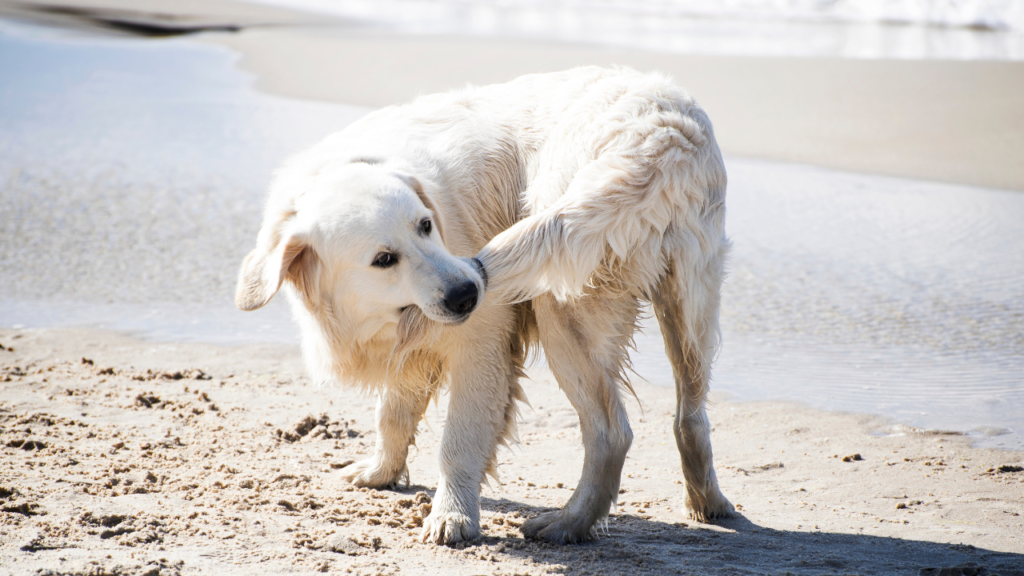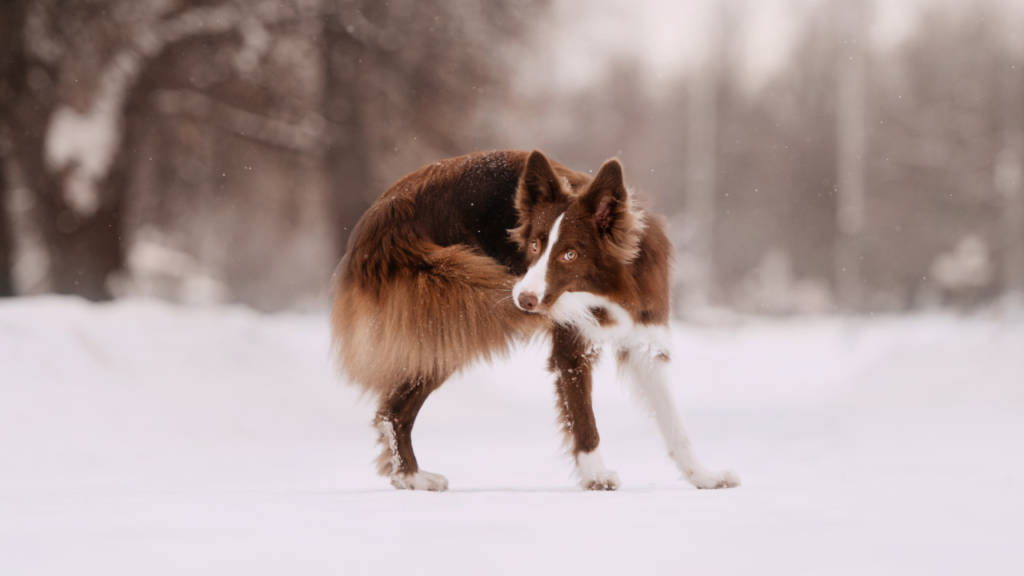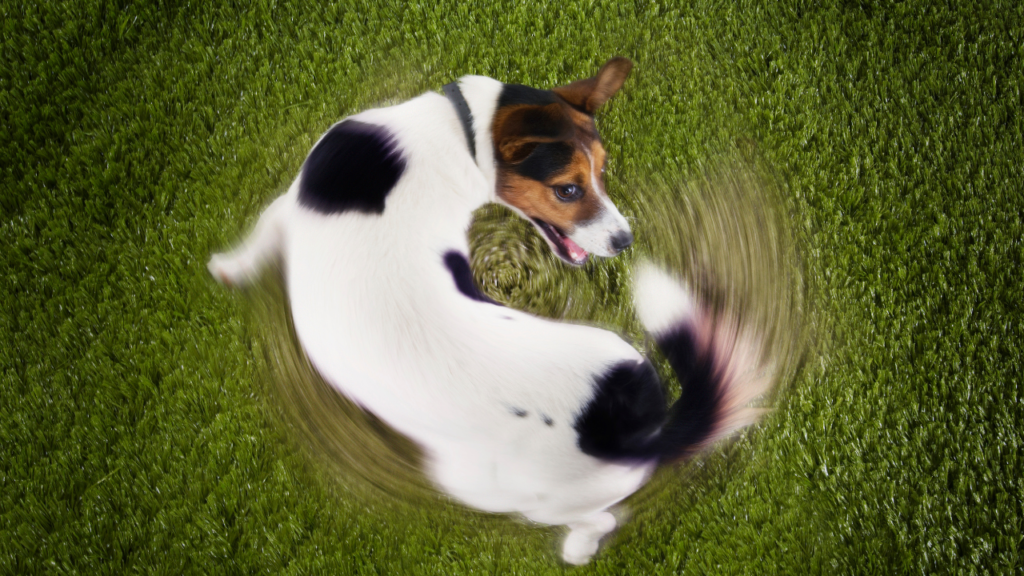
Have you ever wondered about why do dogs chase their tails? Regardless of the size of your home, profession, or lifestyle, the ideal dog is waiting for you. In truth, recognised organisations vary on the number of dog breeds. The American Kennel Club (AKC) lists 200 different dog breeds. The Fédération Cynologique Internationale (FCI), often known as the World Canine Organisation, recognises a staggering 360 canine breeds worldwide.
With so many dog breeds, each with its own size, temperament, and appearance, you might expect their behaviour to vary as much as their looks. However, this is not always the case. Dogs, regardless of breed, have one thing in common: they like to chase their tail. Why do dogs chase their tails? The solution is so obvious that you may find it unbelievable.
Why do dogs chase their tails?

You’ve seen this before. One minute, your dog is completely quiet; the next, he’s zooming around the yard, running after his own tail. While a dog chasing its tail makes for a funny photo, you might be wondering if this strange behaviour is an indication that anything is wrong with your dog. Here are a few reasons why your dog might chase his tail.
They are having a wonderful time.
Fortunately, most dogs chase their tails because they are playing. Puppies especially enjoy chasing their tails, as they are only now realising they have such an appendage attached to their body. Your pup may glimpse his tail out of the corner of his eye and believe he has a companion. Don’t worry if racing in circles makes your dog dizzy. According to Wag!, dogs do not experience dizzy in the same way that humans do.
They’ve got nothing better to do.
Dogs are also known to chase their tails for another (very understandable) reason: boredom. Dogs, like humans, fidget when bored. While we might divert ourselves by playing a phone game, clicking a pen, or twirling our hair, dogs have few options for entertainment. Because dogs require both mental and physical activity to avoid boredom, chasing his tail could be your pup’s way of passing the time when he’s feeling down.
They have an underlying condition.
It is totally normal for your dog to occasionally chase his tail. Unfortunately, dogs who frequently chase their tails may be suffering from an underlying medical issue. Dr. Steve Weinberg, DVM, founder of 911 Vets, tells the American Kennel Club that obsessive chasing could be caused by a brain disorder similar to seizure activity. Other potential causes include a sore location where a tail was docked, an infection, or even cancer.”
They experience anxiety.
Anxiety is not limited to humans. Anxiety in puppies frequently manifests as compulsive behaviours such as tail chasing, excessive grooming, destructive behaviour, persistent barking, pacing, drooling, and in-home urination or defecation. If your dog shows those symptoms, consult your veterinarian regarding the use of medication or behavioural modification.
They might have fleas
If your dog has been bitten by fleas or ticks, he may chase his tail to gnaw on an itchy bite. If your dog chases and chews his tail, check him for fleas or ticks. To avoid a repeat infection, treat your dog for fleas and ticks year-round.
They are genetically prone to chase their tails.
According to a National Centre for Biotechnology Information publication, evidence reveals that some breeds are more likely to chase their tails than others. German shepherds, Anatolian sheepdogs, bull terriers, West Highland white terriers, and Jack Russell terriers all appear to be predisposed to chasing their tails.
Is it wrong if my dog chases their tail?

In general, it is not a problem if your dog chases his tail on occasion. If tail chasing becomes a compulsive behaviour that your dog can’t seem to stop, it could be a indication of a mental or physical illness. If your beastie chases his tail on a regular basis, take him to the vet for a checkup. You can never be too vigilant about your dog’s health, and your veterinarian will be able to spot any underlying issues that are driving your dog’s compulsive behaviour.
Why is my dog chewing the base of its tail when it has no fleas?
While tail biting is usually harmless, it can sometimes signify a medical problem. Your veterinarian will go over several typical issues that might contribute to tail chasing and biting. An external parasite, such as ticks or fleas, is the most likely culprit, however an internal parasite can also induce this behaviour. In general, this indicates that he may have a worm, such as a roundworm or tapeworm. In some circumstances, you can find worms in his excrement. However, a dog doctor would readily diagnose this by examining a stool sample, and you can treat him with a few tablets.
How can I avoid my dog from chasing their tail?
One of the most simple ways to break your dog’s tail-chasing habit is to refocus his attention. Grab your dog’s favourite toy and throw it; he will most likely stop what he is doing to run after it. If his toy isn’t enough to keep him from chewing on his tail, give him a sweet reward. When a well-trained dog is given a command that does not correspond to his behaviour, he will stop. When your dog starts chasing his tail, try instructing him to “sit” or “come here”. It may take some time and work to break him of the habit, but you will finally do so.
It’s fascinating to watch your dog chase his tail, but if it becomes a fixation, you should take him to the vet. Obsessive tail chasing may be a sign of a parasitic infestation, a mental illness, or an underlying health problem. Once your veterinarian has ruled out any potential causes, you’ll want to work with your dog to control — or eradicate — his behaviour.

